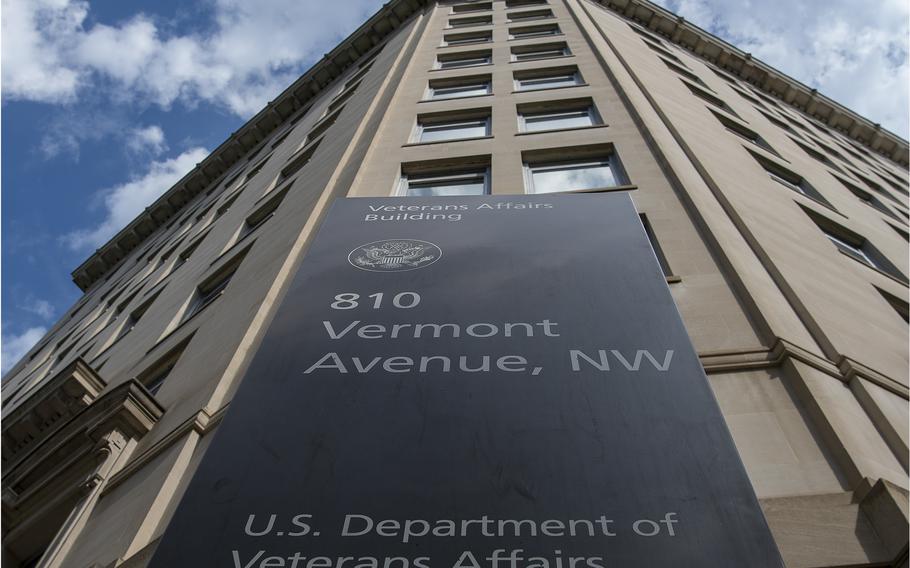
The Department of Veterans Affairs headquarters building as seen in Washington, D.C., on July 6, 2022. (Carlos Bongioanni/Stars and Stripes)
Staffing shortages at the Department of Veterans Affairs and increased reliance on private health care threatens the agency’s ability to provide quality service for veterans, according to a report released Tuesday by a union that represents federal employees at the VA.
The American Federation of Government Employees organized a group about a year ago to compile a report about health care at the VA out of concern for laws passed that allow more veterans to seek services outside the agency and because the VA has had tens of thousands of open jobs across its network nationwide for years, according to members of the union who held a news conference about the report’s findings.
The report calls for the VA to fill all vacancies at the agency, develop detailed, accurate comparisons between the VA’s health care and private providers, change when a veteran can seek care outside the VA, and ensure pay offered within the VA system is competitive with the private sector.
The group’s report — “Disadvantaging the VA: How VA Staff View Agency Privatization and Other Detrimental Policies” — is based on survey results from 2,000 of the VA’s roughly 412,000 employees and was co-published by the National VA Council of the AFGE and the Veterans Healthcare Policy Institute, a nonprofit think tank focused on veterans’ health. The AFGE advocates for workers across the federal government and has more than 283,000 members, according to its website. The VA makes up one of its largest membership blocks.
Among survey respondents, 77% said the VA health care facility where they work has closed beds, units or programs because of staffing and budget shortages. More than half said they have less time to deliver direct patient care and support services than they did four years ago.
The VA now has more than 76,100 job vacancies, according to the report, and it calls on the agency to ease modernization efforts that began in 2018 and centralized hiring by pulling human resources staff away from local facilities.
However, the VA has made aggressive hiring and retention efforts to fill jobs across the agency, according to a VA spokesman who requested he not be identified.
The Veterans Health Administration has hired 22,759 new employees in fiscal 2023, which began Oct. 1, and is on pace to hire 52,000 by Sept. 30, the spokesman said. The Veterans Benefits Administration, which manages benefit claims, has increased its workforce by 1,369 employees, he said.
Veterans’ trust in the VA to coordinate their care exceeds 90% nationwide, whether services are administered at a VA facility or by a private health care provider, the spokesman said.
The union’s report also warned the VA’s modernization efforts have increasingly cut into the VA’s health care budget since the passage of the VA Choice Act of 2014 and the VA MISSION Act of 2018, which increased opportunities for veterans to seek private treatment outside of a VA facility.
The report said VA Secretary Denis McDonough told senators during a hearing in June 2022 that the budget for private sector care had increased from 26% of the VHA’s total annual spending on clinical care to 33% in one year. He predicted that care outside the VA could soon consume 50% of the VHA’s clinical care budget.
The report asks for the VA to change access-to-care standards to include in-house telehealth appointments. When patients go in and out of the VA’s system, doctors have less visibility on their patients’ health, the report said.
“If implemented, even partially, these much-needed changes would provide stronger support for 19 million U.S. military veterans and the federal employees who have volunteered to serve them,” the report said.
In a news conference this month, the VA highlighted its telehealth program and the equipment that the agency can send to a veteran’s home for an appointment. Legislation from Congress would help the VA expand its program.
“We are really hopeful that they can help us get this done,” McDonough said.